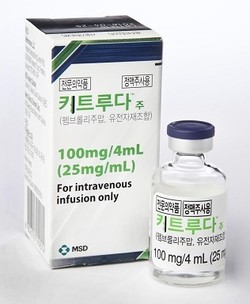The FDA recently authorized Keytruda to be used as adjuvant therapy before and after surgery in patients with early triple-negative breast cancer (TNBC), defying the oncology drug advisory committee’s (ODAC) advice to reject MSD’s application.

However, the controversy over whether the FDA made the right decision is likely to continue, observers said.
On Tuesday, the FDA gave the go-ahead to Keytruda to treat patients with high-risk early-stage TNBC in combination with chemotherapy as neoadjuvant treatment and then continued as a single agent as adjuvant treatment after surgery.
It is the first time the FDA granted the nod for an immune checkpoint inhibitor for early breast cancer treatment. With the latest permit, Keytruda became the only immunotherapy available for not only metastatic but early-stage operable breast cancer.
The FDA’s decision drew particular attention because all 10 members of the ODAC unanimously recommended the FDA to turn down approval for Keytruda in February.
At the time, the committee members said the pathological complete response (pCR) results from the KEYNOTE-522 study were insufficient to grant the nod and that the company should also submit event-free survival (EFS) outcomes to predict patients’ survival rate directly.
Later, however, MSD announced the EFS results at the virtual plenaries of the European Society for Medical Oncology (ESMO). In less than two weeks, the FDA gave the permit for Keytruda.
According to the results of the KEYNOTE-522 study, Keytruda plus chemotherapy as pre-operative treatment improved EFS by 37 percent in the median observation period of 39 months, compared to placebo.
However, some analysts criticized the FDA’s latest approval for Keytruda.
According to a news report by Fiercepharma, SVB Leerink analyst Daina Graybosch pointed out an irony of Keytruda’s indication for adjuvant therapy before and after surgery, based on an exploratory analysis of the study.
Keytruda’s EFS benefit in early TNBC was much greater in patients who had failed to achieve pCR, she said. She raised doubts whether adjuvant therapy of Keytruda after surgery had any value for patients who achieved pCR through Keytruda plus chemotherapy before surgery.
“Besides, it also seems to corroborate the notion that pCR isn’t a good indicator of EFS clinical benefit, therefore reducing pCR’s position as a viable surrogate marker for approvals,” Graybosch added.
Existing drugs authorized as pre-operative adjuvant therapy for early breast cancer patients were mostly based on pCR benefits. However, the latest exploratory analysis results indicated that pCR was not reliable enough as a surrogate indicator of improved risk of recurrence and death, Graybosch said.
Also, the controversy over the latest nod for Keytruda is expected to continue because using the treatment consecutively before and after surgery can raise medical costs significantly, given the high price of Keytruda, while its effect in each stage before and after surgery is not clear.

